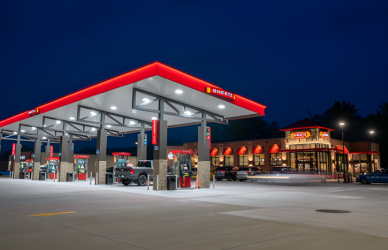Although Americans are warming up to the idea of a mileage fee, they seem more receptive to an increase in the federal fuel tax, provided the revenue is used appropriately.
In its 15th annual survey on federal transportation tax revenue, San José State University’s Mineta Transportation Institute asked Americans about their views on various fuel tax increases and new mileage fees. A majority is open to certain mileage fees, but nearly three-quarters support a fuel tax increase under specific conditions.
Survey respondents were asked if they support a 10-cent increase to the current 18-cent federal gas tax. They were given six scenarios on how the revenue would be used:
- General transportation
- Reducing local air pollution from transportation
- Decreasing the transport system’s contribution to global warming
- Maintaining streets, roads, and highways
- Reducing accidents and improving safety
- Reducing traffic congestion
Only 35% support a fuel tax increase for general transportation. However, support jumps to over 70% if the revenue is allocated for road maintenance or improving safety. Around 60% support a tax increase if the funds address environmental issues or congestion.
People are less enthusiastic about a mileage fee. Respondents were asked about replacing the federal fuel tax with a mileage-based fee. Only 39% support a flat-rate fee of 3 cents per mile for all vehicles. However, half favor a variable green-rate fee, where the average rate is 3 cents per mile, with lower rates for less polluting vehicles and higher rates for more polluting ones.
Support for both a flat-rate and green-rate fee has significantly increased since 2010. Back then, only 22% supported a flat-rate fee, and 34% supported a green-rate fee.
The survey also shows more support for a mileage fee on top of the federal fuel tax for commercial vehicles. Nearly 60% support an additional mileage fee for truckers, and 53% are okay with an additional fee for taxis and ride-hailing services like Uber and Lyft.
There isn’t much support for giving electric vehicles preferential treatment. Nearly half of respondents believe electric vehicles should be charged the same mileage fee as fossil fuel-powered vehicles.
If a mileage fee were implemented, people prefer incremental payments. Nearly half favor paying each time they fuel up or charge, about a third prefer a monthly bill, and around 20% like the idea of an annual bill.
The survey also highlights the general lack of knowledge about the federal fuel tax and mileage fees. Only 2% of respondents knew that the federal gas tax hasn’t been raised in over 20 years, and about 60% were unaware of mileage fees. Despite this, more than half have privacy concerns about a mileage fee, and half consider it fairer than fuel taxes.
While the Mineta Transportation Institute’s survey shows growing support for a mileage tax over the past 15 years, a simple majority may pose a challenge for states seeking new transportation funding methods. As vehicles become more fuel-efficient, fuel tax revenue is decreasing.
According to the Tax Foundation, only three states generate enough dedicated revenue to fund transportation spending. Most states have considered a mileage fee, with four states currently running active programs for passenger vehicles and four targeting heavy commercial vehicles.
Michigan is the latest state to explore a mileage fee, launching a pilot program for a mileage-based road-usage tax next June. The state faces an estimated $3.9 billion annual deficit in road funding.
Source: Land Line











